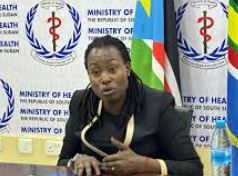South Sudan Health Minister Yolanda Awel on Sunday said the Cholera outbreak is exacerbated by inadequate sanitation, limited access to clean water, and the mass movement of refugees and returnees fleeing conflict in neighboring Sudan.
She made the remarks while addressing a press conference at the Emergency Center in Juba to address the ongoing cholera outbreak that has spread across several regions, including Upper Nile, Juba, and Malakal.
“Cholera thrives in conditions where hygiene is compromised,” she stated. “The ongoing humanitarian crisis has amplified these challenges.”
The Ministry has activated the Incident Management System (IMS) to coordinate a multisectoral response, including surveillance, case management, infection prevention, improved water, sanitation, and hygiene (WASH) interventions, and the planned deployment of over 150,000 oral cholera vaccine (OCV) doses to affected areas.
Dr. Kediende Chong, Director General of Preventive Health Services and Emergency Response, emphasized the role of refugee movements in the outbreak.
“The outbreak originated at transit sites where incoming refugees and returnees lack safe drinking water and proper sanitation. Transmission is directly linked to overcrowding and contamination,” he explained.
International partners also expressed their commitment to supporting South Sudan’s efforts. Anita Kiki, Deputy Special Representative of the UN Mission in South Sudan (UNMISS) and Resident Coordinator, stressed the importance of collaboration.
“The government is taking the lead in multisectoral coordination, and we stand ready to enhance prevention, logistics, and awareness-raising efforts,” she said. “It is critical to move from prevention to an enhanced response, ensuring resources and information flow efficiently to combat this outbreak.”
The health ministry called for urgent support from national and international stakeholders, emphasizing the need for Funding to establish cholera treatment centers, Provision of medical supplies and logistics for vaccination and WASH interventions, and Community sensitization to promote preventive measures.
Minister Awel concluded, “We are determined to mitigate the impact of cholera, just as we have in the past. However, we need everyone at the table – ministries, partners, and communities – to prevent further spread and save lives.”




